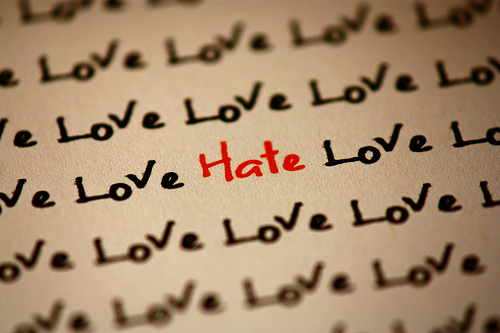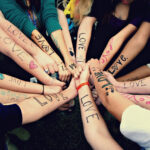Darkness cannot drive out darkness; only light can do that. Hate cannot drive out hate; only love can do that. – Martin Luther King Jr.

How does one conquer hate? May I present one possible method? We should always try to remember that we cannot force this change of heart on others, only encourage them to change by our behavior and our example.
What does that mean?
To me, this quote is about a fundamental truth of the universe, and the corresponding relationship in the human heart. It starts out stating the obvious. Darkness is a lack of light. More darkness cannot make it less dark, which is something only bringing light can accomplish.
Similarly, the quote tells us that hate cannot drive hate from your heart or the hearts of others. The only thing which can do that, according to the quote, is love. While the analogy breaks down a little with hate not being exactly equal to the absence of love, the premise is spot on.
In the end, hate will continue if left unopposed. The question is how to best oppose it. The quote states what I believe is one of the best and simplest methods. While no method is fool-proof or without risk, it is the best and most effective method I have seen or experienced.
Why is bringing love to fight hatred important?
If you’re going to try to drive out hate, you need to bring the love. It won’t be pleasant, but it’s the truth. Bringing the love doesn’t mean you believe as they do, or even that you like them. It simply means that you consider the human bond to be stronger than their hate.
If you match them hate for hate, the world will not be a better place for your effort. What little satisfaction you gain will be temporary at best, and will eventually be to the determent of everyone. That’s neither a good plan, nor is it much of a legacy for our children to inherit, a world filled with more hate than ever.
It is my belief that most hatred is based on inaccurate information, or on stories told about injustices of old. The hate can only be kept alive if the recipients of the hate act according to the script. The most disruptive thing we can do to the script is to show them love and compassion, and blow the narrative apart. Are you willing to try?
Where can I apply this in my life?
I would hope you would use this any time you felt hatred towards another, and also in response to anyone who showed hatred towards you. I would also hope you would apply it both to personal issues, as well as larger group issues, whether they are based on race, creed, religion, affiliation or any other aggregation.
In High School, I got a lot of grief because I was the exact model of a geek. I was a tall, skinny, glasses wearing, acne faced geek. I was even involved with the Chess Club (although not good enough to make the team) and a competitor in the Math Club.
I didn’t know about this quote back then, so I learned to ignore the haters instead of learning to feel compassion and love towards them. It wouldn’t have made much of a difference for them, as rational thought and teen aged boys aren’t always the closest of friends. But it would have helped me.
Where in your life are there haters, and what is it that they hate? Sometimes hate can be based on group rivalries (High Schools are really bad about that – nerds vs jocks, as an example). Other times it’s more specific to you as a person (romantic rivals or bullies come to mind).
However, even if you know that it won’t work on them, that’s still OK. The exercise is for you, not for them. Whether it is a hatred of them directly, or a hatred in return for their hatred, nothing will change until you can set your hate aside.
As with most things in life, you have no control over the other person. Once you realize that fact, this quote becomes an exercise of strengthening yourself, and of overcoming your own hatred, anger, and resentment. How much better would your life be if you could accomplish that?
Even if you never get to the point where hatred no longer exists within you, nor could any action stir it, I believe that it is a laudable goal. I believe the journey, however poorly we manage it, is a worthy effort. Even if it only reduces the hate on the planet by one person, it has proven valuable to all humanity.
And if, like the author of the quote, you can live this way and inspire others by your actions, then you will have accomplished far more than any law against hate. You will have lived it, and helped others to recognize the value of it. And that is truly a noble deed.
From: Twitter, @elimin8prejudic
confirmed at : http://www.brainyquote.com/quotes/quotes/m/martinluth101472.html
Photo by Skley
Happy Birthday to Martin Luther King, Jr, born 15 January, 1929.







This is straight from the gospel!
That is an interesting thought. MLK was a preacher, so he would be quite familiar with those quotes. I, however, am not. Do you recall where it is? Thanks in advance.
thank u so much
You are so very welcome. I’m glad the quote meant something to you.
Thanks for stopping by and for leaving a comment.
Perhaps hatred is not exactly the same thing as a simple lack of love. Maybe being devoid of caring could be characterized as being indifferent, but that may be just as terrible as hatred. Either way, I think hatred or resentment is what fills that void when love is not present. In the void of indifference, compassion and empathy and human responsiveness or caring for the fate or well-being of another simply cease, and the people for whom we lack that love become an annoyance, an inconvenience, a burr, and eventually the enemy–the elimination of which is assumed to be the solution for all major ills. The end result? alienation or separation of friends, divorce, persecution, abortion, war, genocide. The opposite? reconciliation, nurturing, kindness, appreciation, self-sacrifice, cooperation, sharing. Maybe these latter seem trite, but if we lived them, would we think our lives thin? I think not. It is not easy to express the richness behind these words and the joy that fills us when their true meaning is realized in our lives.
As for the effect these positive responses can have on people given over to hate, well that depends on how deep they have gotten themselves and how able they are to still feel.
It all depends on how you slice things. Some put love at one end, hate at the other, with apathy in the middle, others put strong emotions at one end and weak ones at the other. I don’t know what the best way to represent them are, but I have seen love work wonders on hate, and have yet to see apathy do anything close to similar. However, my sample isn’t large enough to be statistically valid, so I’m just giving my opinion. 8)
Thanks for sharing another view point. It’s always refreshing to hear from others, and look at something through fresh eyes.